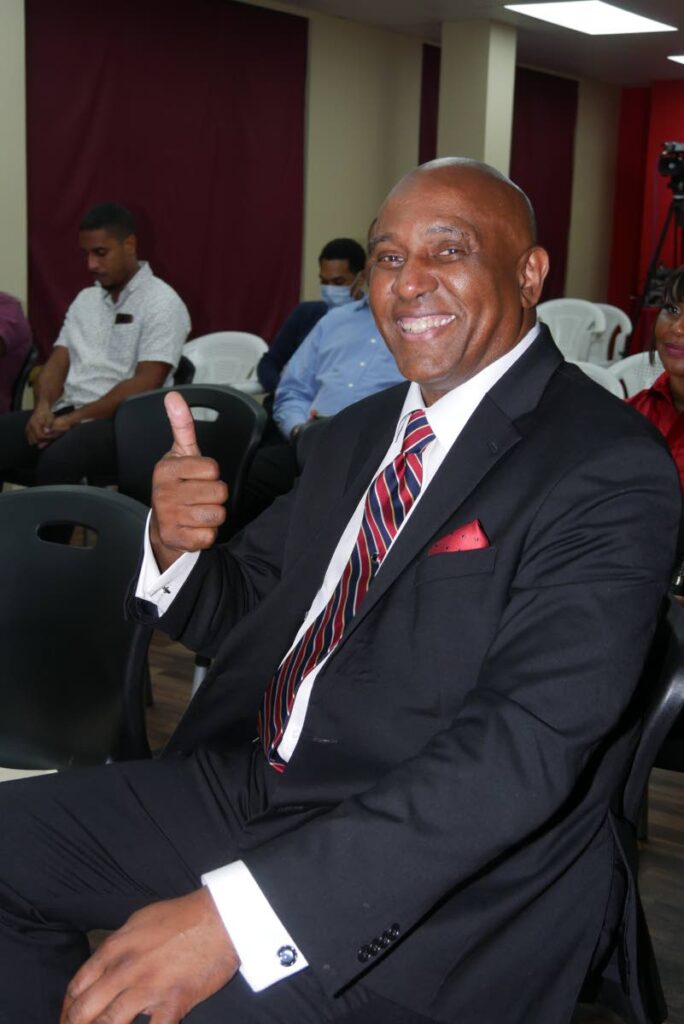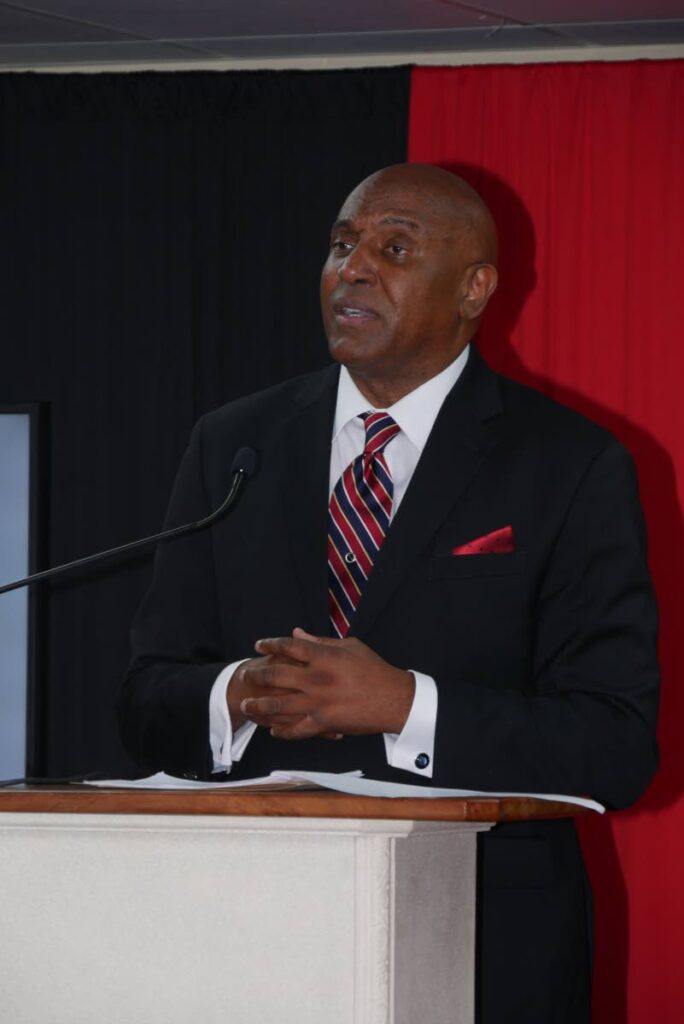PNM leader nominee Boynes aims to build up party

If he becomes political leader of the PNM, Ronald Boynes first plans to build up the party, and then communities, with the goal of improving the country as a whole.
Boynes, 59, filed his nomination papers to contest the position of political leader on October 10 at the PNM’s Central Office in Enterprise, Chaguanas.
He told Sunday Newsday he intends to address the disconnect between party groups and the leadership.
Explaining the make-up of the party, he said the groups were the basic unit. Each constituency had polling divisions and party groups were aligned to each polling division.
Party group members were aware of issues in their divisions and should report those issues to the party. In turn, the reported issues should be dealt with by or inform the policies of the General Council and the political leader, later to affect the municipal corporations and eventually the Parliament, to become law.
“What has been happening, in my view, in recent times, is that there has been a disconnect between the party groups and the leadership, which some people consider to be a disregard and a disrespect for their voices.
“The effect is, what is really happening on the ground is not reaching up, or if it’s reaching up, it’s being ignored or disrespected. That’s something, as political leader, I will address and correct immediately.”
Boynes unsuccessfully contested the PNM vice chairmanship in 2018 and, in 2014, the position of general secretary on the slate of Pennelope Beckles, who was running for leadership at the time.
He said he welcomed democracy in the party, as he believed it would keep the party “vibrant” if its members remained “issues focused.” He planned to address several issues he had thought about and devised solutions for, saying his plans needed to be enacted now.
“I believe I have a vision for the party and the people of TT. I believe I have the heart to do it. I am very sensitive to and I recognise their needs.
"I don’t feel that is happening now. I see there is a vacuum and if I go for any other position or not participate, my voice would not be heard.”
At the very least, he said he would like his ideas to be brought to the forefront and be used to improve the party as this was “an important mechanism for producing the type of politicians that will then enact plans, programmes and policies for the benefit of the nation.”
LIVE TO SERVE
Born and raised in Sangre Grande, the father of four was admitted to the bar in 1986 and practises corporate and real-estate law.
He said he always had a love for his community, so he and his brother, Roger, a former minister of Sport and Youth Affairs in the Patrick Manning administration, used to organise sporting competitions, lessons for children and other community activities.
Although he supported his brother’s political career in an unofficial capacity, he officially became involved in politics in 1996 when some friends encouraged him to join the United National Congress.

“But within a matter of weeks I resigned from that party, because I recognised it was not what it represented itself to be. Subsequently I joined the PNM, where I’ve been for the past 25 years.”
Since then, he has served as the PNM chairman of the Toco/Manzanilla constituency for four years, and, from 2003-2010, he chairman of the Sangre Grande Regional Corporation.
“When you grow up in a place and love it, and are appointed to a position of authority, you want to do something for that place.”
He and then vice chairman of the corporation, councillor for Valencia East/Toco Terry Rondon, worked on a plan to improve the area. They realised the region was large (about 24 per cent of Trinidad’s coastline) and full of potential, with resources like aggregate, flora and fauna, nesting turtles – but its people were poor.
“When we got into council in 2003 we pulled together all the plans that had gone before. We went to the community – primary and high schools, all 41 villages and communities within the region – and presented it, discussed it, debated it and got the people’s input and feedback.”
They took the resulting development plan to the then minister of local government, Hazel Manning, who took it to Cabinet, where it was approved, empowering the region, establishing tourism projects and fixing agriculture access roads and other infrastructure by partnering with the private sector.
Hazel Manning liked the template and, in an attempt to raises the development to a national level, appointed regional planners from all the municipalities to actuate plans.
“The kind of work we did in Grande, where we analysed the region, and involving the people in that development, is really not happening. To my mind, this is responsible for the poverty and the violence in the country, because we are not empowering communities.
“I recognised unless you have a stake in something, unless you have an opportunity to live, work and play in your community, unless you have a sustainable job, if your mind is not properly grounded, you become an ‘at-risk’ individual.”
Similarly, he said natural resources should be the focus of national development strategies with the aim of decentralisation, as well as autonomy for and development of communities across the country.
He said very little progress had been made on the Local Government Reform Bill over the years and it needed to be accelerated so provisions could be made for municipalities to get a portion of the national budget to operate quickly and efficiently.
He said it was time to address infrastructure in at-risk communities, even if government had to borrow or withdraw from the Heritage and Stabilisation Fund.
“It will stimulate business, it would create wealth, and it would give us the space where people could feel they actually belong to a community that cares about them.”
Boynes believed these improvements had to extend to squatting communities. He said the State Land Regularisation Act obligated the State to install infrastructure including roads, drains, and lighting, and give people living there for decades ownership of property. He said while the programme was “excellent,” it was not adequate, and the process was moving too slowly.
“If you check, a lot of violence comes from those at-risk communities – whether in Laventille, Morvant, Train Line in Marabella, Bagatelle – that are disorganised and people have so-called squatting rights, but not legitimate titles to property.”
He believed implementing the act more efficiently would add value to the communities and address the residents’ needs.
VISION FOR PNM
If he wins the election, he also intends to get feedback on the issue of compulsory national service, since he believes such moves have helped several countries towards great development over the past decades.
He suggested a year and a half of compulsory national service during which youths could learn a skill or work in an area of their interest when they finish secondary school. He would like to ask the party to consider formulating policies on the issue and get feedback from the party base, because brain drain is a big problem in TT. He also believes it would encourage people to be more patriotic.
“All of us have a common ideal that we have benefited from being citizens, from the cradle to the grave. We desire to make this country a better place, and we all have an input to do so.
“We need to create the enabling environment to have our people to be properly trained, and have the job opportunities for them to create that level of security, stability and prosperity for them and their families. I believe we are really waiting to unlock the potential of TT.”
Boynes said the party needed calm and sobering leadership, a leader who spoke positively, of positivity, empowerment, growth, and development. And he believed his achievements at the Sangre Grande Regional Corporation recommended him for the leadership position and spoke to how he would operate and govern.
He pointed out that incumbency had its advantages, so he believes there needs to be a proper approach to the elections by the committee, namely that it performs its duties transparently and justly for all nominees.
He therefore recommended that, in the future, the internal elections should be conducted by an independent body similar to the Elections and Boundaries Commission, so the process could be transparent and insulated, and there would be no allegations of favouritism or tampering.
He added that he had full confidence in the membership to make the right decisions, and invited people to listen to his message. And, although he does not have a slate, he is prepared to work with whoever was elected to office.
“I’m not about individuals. I’m about purpose. We are all here for a purpose, and we’re creating a legacy of peace, prosperity and stability for the country, that young people like my children would stop dying in three and fours.
"I’m invested in that. I believe we have to submerge all our emotions to achieve the greater good.”

Comments
"PNM leader nominee Boynes aims to build up party"